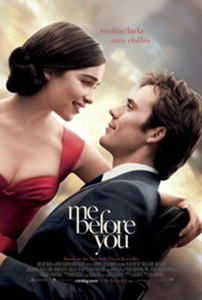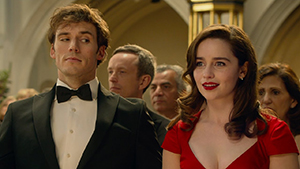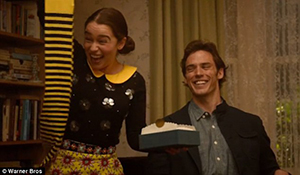Little more than a thinly-structured attempt at forcing tears out of you, “Me Before You” is a testament to the worst kind of romantic movie. Rather than develop characters, a story, or a point to all this, Thea Sharrock simply throws on the soft filter and has Emilia Clarke make doe eyes while wiggling her eye brows. All the “controversy” around the assisted suicide plot line isn’t even close to the worst thing about this movie. For a film marketed directly to women, it has one horrible message to sell them about their self-worth.
Young and quirky Louisa “Lou” Clark (Emilia Clarke) moves from one job to the next to help her family make ends meet. Her cheerful attitude is put to the test when she becomes a caregiver for Will Traynor (Sam Claflin), a wealthy young banker left paralyzed from an accident two years earlier. Will’s cynical outlook starts to change when Louisa shows him that life is worth living. As their bond deepens, their lives and hearts change in ways neither one could have imagined. (Synopsis by Warner Bros. Pictures)
Romantic films aren’t exactly known for being great movies, and we don’t expect them to be. However, there is an expectation that any film should uphold some sort of moral imperative against the relegated ethics of the past. Yet here we are with a film that treats the main female characters worse than you’ll see on any screen for the rest of the year. There is no direct abuse, but the message comes through louder than the sappy overtures of the soft filter: a woman’s value is derived from a man.
Louisa is shown to have no value in the world outside of a quirky fashion sense and cloyingly bubbly personality. She has no prospects at making herself into a fully realized human until William transforms her by telling her how to be one. Wait, it gets worse. Repeatedly Louisa is literally called an idiot to her face for not understanding how the world works (you know, like a man does). The payoff at the end of the film is a letter from William literally telling her how to live her life going forward. The message being she would never have figured this out if a man hadn’t set her straight. The only other major female character, William’s mother, is shown repeatedly having “sense talked into her” by the men in her life related to William’s end-of-life decision. This is cringe-worthy even if you have little interest in women’s rights.
It gets worse. My wife assures me that Louisa is better defined in the book. I assured her I don’t care, because the film makes her look like a horribly selfish person. Her entire premise for William not going through with his assisted suicide is that she wants him to be around. Forget the fact that he is in a combined physical, mental, and emotional hell. The fact that she fell in love with him after six weeks should be enough for him to spend the rest of his life in silent agony so she can make moon faces at him. Louisa’s boyfriend doesn’t fare much better. The film attempts to show him as fairly aloof and self-deluded (they deserve each other, am I right?), but when he attempts to reconcile with her, she simply leaves him. This doesn’t work tonally at the point in the film where it occurs, but the continued emphasis on Louisa’s self-interest over all other considerations certainly makes this choice look questionable.
Manufactured controversy or not, the only redeeming part of this film is the fairly frank discussion of assisted suicide. It is never romanticized or used too manipulatively. Some may argue the manipulative point, but within the context of the film, all the characters react realistically to that decision. The bigger problem here is it is hard to care about Louisa emotional reaction to William’s commitment, simply because of how unlikeable her character comes across. It is to be expected that his family and caregivers would have trouble coming to terms with that decision. It is emotionally manipulative to tack a romance-based love story onto that decision. You can have the same impact with Louisa falling in love with him as a caregiver rather than a “lover.” They got there with William’s mother and male caregiver. Why does Louisa need to exist only within a single context of foolish love?
This is a mess from front to back. The actors over-sell their parts to a comical degree. Try not to laugh every time Emilia Clarke leans in for a close up and her eyebrows raise up to impossible heights while making the same face Bambi made the first time he walked. The symbolic directorial choices are eye-rollingly bad. You’ll know William has changed, because he shaves and wears different shoes! Ugh. This is a film that could have either been a bad film or a film with a bad message. It really can’t be both, but it is. It is embarrassing to watch how unapologetically degrading this is while pretending to be romantic. Especially when the simple solution of letting Louisa define her own life as an individual after meeting William would have corrected all these problems.
“See It/ Rent It/ Skip It”: Skip it. I spent the film trying to figure out how William was actually going to die. Drive his wheelchair off the castle wall? Fall down a cliff? Wrap it around a tree? There has to be a parody somewhere.
ONE AND A HALF STARS out of four.
Directed By: Thea Sharrock
Rated PG-13 for thematic elements and some suggestive material.
Runtime: 1 hr. 50 min.






Leave a Reply
You must be logged in to post a comment.